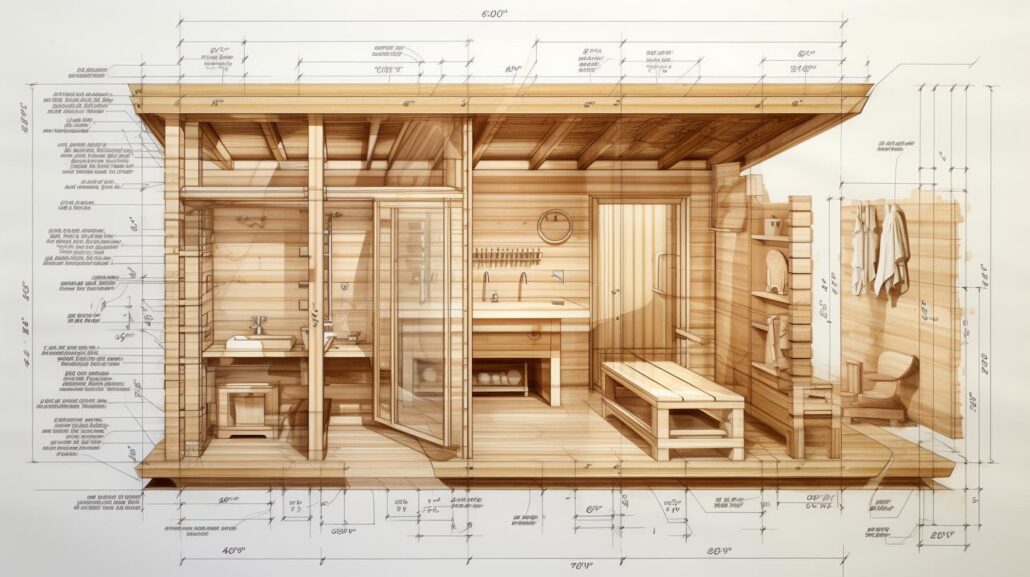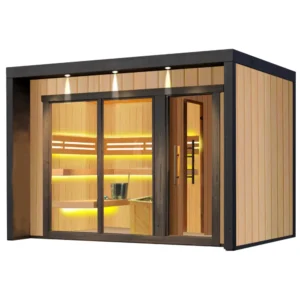Introduction of Pine Sauna Wood
Choosing the right wood for your home sauna is more than an aesthetic decision — it impacts safety, comfort, durability, and maintenance. Pine is often considered because it’s affordable and widely available, but is it the right choice for your sauna project? In this post, we’ll explore whether pine works, how it compares to other woods, and how you can use local context (e.g. New Jersey / New York area) and your existing product links to improve SEO & AI-visibility. You’ll also find embedded product links to your Veritas Solus models for inspiration.
Why Wood Choice Matters in Your Sauna
When building a sauna room (whether indoor or outdoor, dry sauna vs steam-enabled), your choice of wood affects many important factors:
-
Thermal Behavior & Stability: Wood density, grain structure, and moisture content affect how the wood heats up, how hot it feels to the touch, and how stable it remains under repeated heating / cooling cycles. Low-density woods may cool faster; higher-density or better-treated woods retain heat more steadily.
-
Moisture & Humidity Resistance: Saunas generate humidity (especially if you pour water over sauna stones, or have steam). Wood that resists warping, mold growth, or splitting under moisture is preferred.
-
User Comfort & Aroma: Some woods produce a pleasant scent when heated (e.g. cedar). Others are neutral (e.g. aspen, hemlock). Aroma can enhance the sauna experience or — if excessive — it may bother people.
-
Safety & Resin / Sap: Woods with knots or high resin content can ooze sap when hot, or develop sticky patches. That’s undesirable for benches or walls.
-
Durability & Maintenance Costs: Beyond the initial purchase cost, consider how often you’ll need to clean, reseal, repair or replace wood panels or bench surfaces. Maintenance overhead is part of the long-term cost.
Given all that, choosing pine is possible — but you need to understand the trade-offs and use best practices.
Is Pine a Viable Wood for Your Sauna?
Advantages of Using Pine
-
Lower Cost & Easy Availability
Pine is often significantly less expensive than premium woods like Western Red Cedar or high-grade hemlock. It’s readily available at many lumber yards and home improvement stores, which makes it appealing for budget-conscious DIYers or home-sauna projects. -
Warm, Rustic Look
Pine planks have a light, inviting wood grain. If you like a more natural / country / rustic aesthetic, pine fits well. Its color is typically lighter (soft honey / yellow-tan tones), which may complement your interior design. -
Ease of Handling
Pine is a softer wood compared to many hardwoods. That makes it easier to cut, sand, finish, and install (especially for benches, moldings, trim, or interior panels).
Drawbacks & Risks of Pine Sauna Wood
-
Resin / Sap Leakage
One of the biggest concerns with pine is that knots or resin pockets may heat up and ooze sap when exposed to high temperatures. That is messy (sticky surfaces), can smell, and could degrade the user experience.As one Reddit user put it:
“Lower grade pine may ooze sap for some time when heated.” -
Less Moisture / Decay Resistance
Compared with woods like cedar or hemlock, pine is more vulnerable to humidity cycles, which over time could lead to small cracks, warping, or reduced structural stiffness under repeated heat /cool cycles. -
Shorter Lifespan / Higher Maintenance
Because pine may absorb more moisture or suffer minor deformation over time, you might need more frequent maintenance (e.g. sanding rough edges, resealing surfaces, or replacing panel components). -
Less Premium Perceived Value
In a luxury or high-end sauna build (e.g. for resale value or spa-quality expectation), pine may be perceived as less premium compared to cedar / hemlock, particularly by buyers or users expecting natural aroma, long-term durability, or upscale finishes.
How to Make Pine Work Well
If you decide to use pine, follow these best-practice tips to mitigate the risks:
| Recommendation | Why it Helps |
|---|---|
| Use clear-grade or low-knot pine | Fewer knots → less risk of resin pockets and sap leakage |
| Ensure kiln-dried or thermally-modified pine | Lower moisture content → more stable under heat/humidity cycles |
| Apply sauna-safe sealant or protective oil periodically | Helps limit moisture absorption, reduces surface wear |
| Limit pine usage to dry-heat / low-humidity scenarios or lower-frequency use | Less stress on the wood |
| Combine pine with more resilient woods for benches or high-contact surfaces | For example, use pine for ceiling or walls, but hemlock or cedar for benches |
| Ensure good ventilation & allow proper drying between uses | Minimizes trapped moisture that could degrade wood quicker |
In short: pine can be used if you select the right grade and treat / maintain it properly — but it demands more care than more robust woods.
Alternatives: Cedar, Hemlock, Spruce & More
Here’s how pine compares to other common wood options:
| Wood Type | Pros | Cons |
|---|---|---|
| Western Red Cedar | Excellent resistance to moisture & decay, naturally aromatic | Higher cost; aroma may annoy sensitive users |
| Hemlock | Durable, more neutral scent, good stability under temperature cycles | Cost is intermediate; quality availability may vary regionally |
| Spruce | Affordable, relatively stable; often used in traditional Nordic sauna designs | May require careful selection to avoid knotted or resin-rich boards |
| Aspen / Basswood | Hypoallergenic, almost neutral scent, smooth texture for benches | Slightly more expensive; sourcing may require specialty lumber yards |
| Thermally-Modified / “Thermo-Wood” | Enhanced dimensional stability & moisture resistance (e.g. thermo-pine) | Upfront cost higher than untreated pine, but lower than premium cedar in many cases |
These alternatives tend to offer a more “forgiving” performance under heavy or frequent use, or when humidity is high.
Climate & Usage Considerations
If you’re building a home sauna in the New Jersey / New York region:
-
Winters are cold and often very dry indoors, while summer months can be humid. This means your sauna walls and benches undergo cycles of temperature and humidity variation. Stability under those cycles is key.
-
Indoor vs Outdoor Installation: An outdoor backyard sauna or spa-adjacent sauna enclosure will experience more ambient humidity or rain exposure, so wood must be more weather / moisture-resilient (e.g. better sealed or paired with effective vapor barrier / insulation).
-
Local building codes / fire & electrical safety might apply (for example permits for structural changes, heat-resistant materials, or ventilation). Always check with your township or county building / permitting office when you install a sauna in your home.
Maintenance & Longevity Tips (for Pine Sauna Wood & Other Woods)
To help your sauna last for years with minimal issues, use the following care plan:
-
Initial Seasoning & Drying
After installing wooden interior panels / benches, allow the sauna room to dry naturally (vent doors open) before first high-heat session. This helps residual moisture settle and reduces the risk of warping. -
Cleaning & Ventilation
After each use, leave the door open for ventilation. Wipe down benches or any sweat / moisture. Avoid leaving damp towels or standing water on the wood surfaces. -
Protective Coating / Oil Maintenance
Use sauna-safe oil, wood-friendly, high-heat tolerant sealants once or twice per year (depending on usage). Avoid coatings that release VOCs under heat. -
Monitor for Cracks / Wear
Every 6–12 months inspect bench boards and wall panels for any small cracks or warping. If damage is found, sand lightly and reseal, or replace that plank. -
Control the Heat & Humidity Cycles
Avoid extreme sudden changes (e.g. going from 50 °F to 200 °F instantly). Warm-up phases should be gradual to minimize stress on wood. -
Consider Spare Components
For high-contact surfaces (benches, headrests), keep extra wood planks on hand (same species / grade) so you can replace worn boards without dismantling large parts.
FAQ about Pine Sauna Wood
Q1: Is pine safe for sauna benches?
A1: Yes — provided you use clear-grade or kiln-dried pine with low knots, and apply sauna-safe surface treatment. But pine benches may require more frequent maintenance than cedar or hemlock.
Q2: How long will a pine-lined home sauna last?
A2: With proper care, ventilation, and occasional re-oil/seal, a pine-lined sauna can last 5–10+ years in home use. But in high-humidity or heavy-use environments, premium woods may last longer with less upkeep.
Q3: Can I buy suitable sauna wood near New Jersey / New York?
A3: Yes — many lumber yards or specialty sauna suppliers carry kiln-dried pine, cedar, or hemlock. Also you can explore our Veritas Solus Garden Sauna OS3025 which offers pine / hemlock options.
Q4: Should I choose wood grade or species first?
A4: Both matter — species affects durability and moisture resistance; grade (knot-free, kiln-dried, thermally modified) affects risk of sap, warping, and maintenance cost. High-grade pine may perform nearly as well as lower-cost cedar, but with compromises.
Conclusion
Pine can be used to build a home sauna, especially for DIY or budget-conscious projects. But it demands care: selecting the right grade, applying maintenance, and designing for your local climate (e.g. New Jersey / New York area temperature & humidity cycles).
For those looking for affordable sauna options, check out the Outdoor Sauna Factory for customizable solutions.



